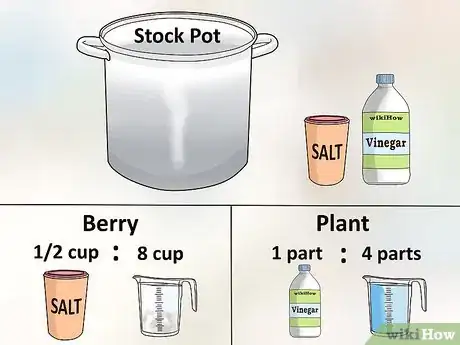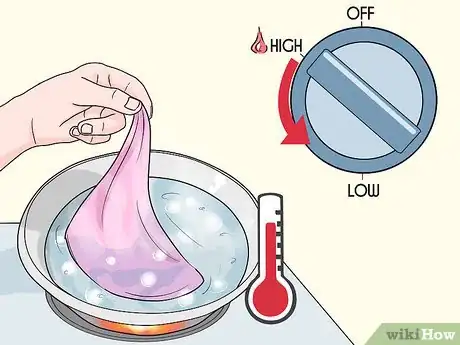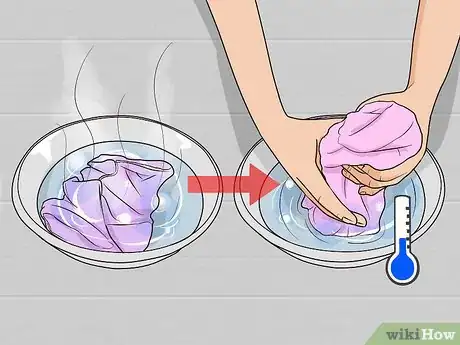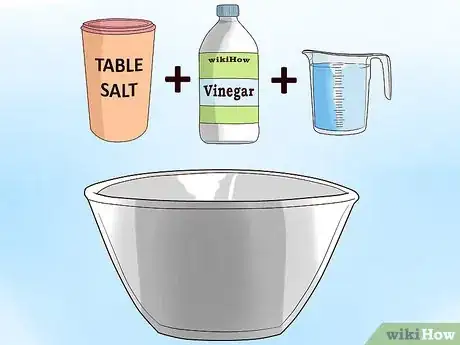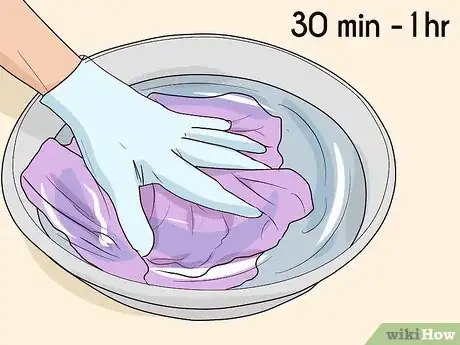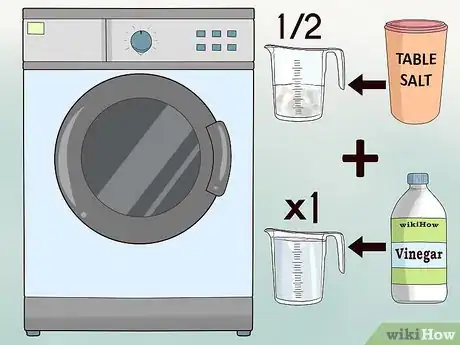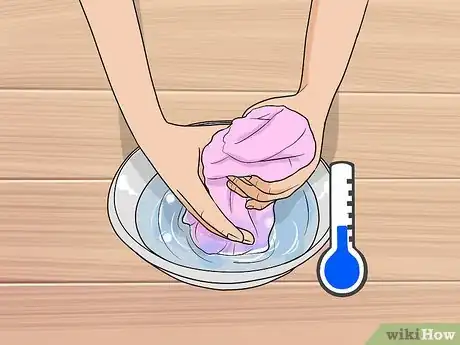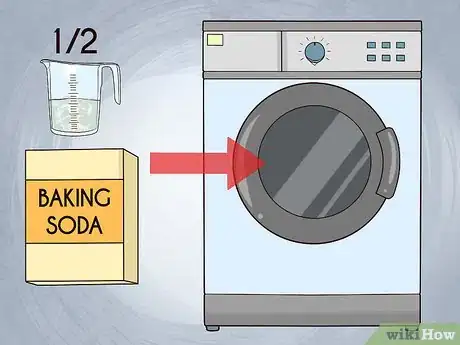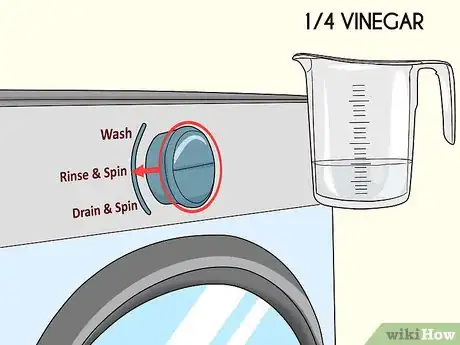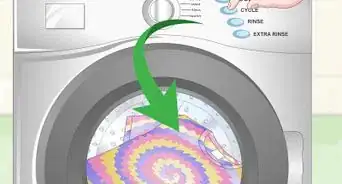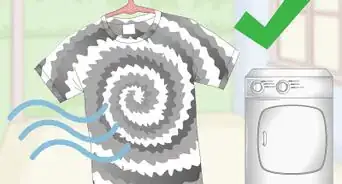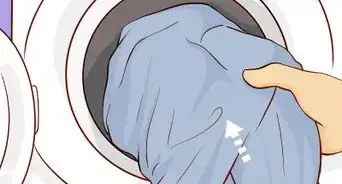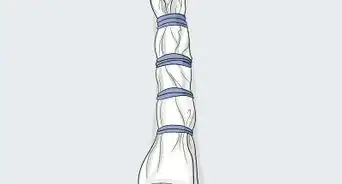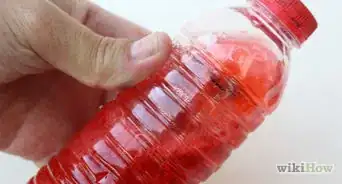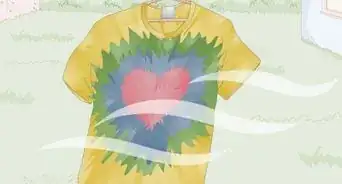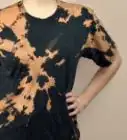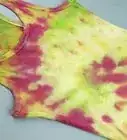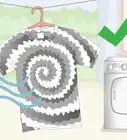This article was co-authored by wikiHow Staff. Our trained team of editors and researchers validate articles for accuracy and comprehensiveness. wikiHow's Content Management Team carefully monitors the work from our editorial staff to ensure that each article is backed by trusted research and meets our high quality standards.
There are 9 references cited in this article, which can be found at the bottom of the page.
This article has been viewed 167,828 times.
Learn more...
If you plan to use natural dye, you’ll want to pretreat your fabric before dyeing, since natural dye tends not to be as vivid as other dyes. Once you’re finished dyeing your fabric, set the color with a solution of water, white vinegar and salt. Wash your newly tie-dyed fabrics in separate load from your other laundry for the first wash or two. Finally, maintain the brightness of your dyed fabric by always washing it in cold water. You can enhance the color protection by adding vinegar and baking soda to your washing machine for the dyed fabrics.
Steps
Pretreating Fabric for Natural Dyes
-
1Fill a large pot with a fixative solution. Pour salt and/or vinegar into the pot. Add enough cold water that you will be able to submerge your fabric later.[1]
- For berry dye, use 1/2 cup of salt for every eight cups of water.
- For plant dyes, use one part vinegar to every four parts water.
-
2Add fabric to simmering solution. Bring the solution to a boil over high heat. Reduce the temperature to medium-low to maintain a simmer. Submerge the fabric and allow the solution to simmer for one hour.[2]
- You can use tongs to carefully lower the fabric into the simmering solution.
Advertisement -
3Rinse out the fabric. Remove the pot from heat and allow it to cool. Remove the fabric from the pot and wring out the liquid. Hand wash the fabric with just cold water.[3]
- If you’re in a hurry, you can drain the pot and cool down the fabric right away with cold water in the sink.
Setting Color After Dyeing
-
1Dilute vinegar in a bucket or large glass bowl. Pour in one to two cups of vinegar. Add a generous sprinkle of sea salt or table salt. Pour enough cold water in the container to submerge your fabric.[4]
- Use a teaspoon or two of salt for a large bowl. Use more for a bucket.
- Use one cup of vinegar for a bowl or two cups of vinegar for a bucket.[5]
-
2Submerge the fabric to soak for a period of time. Put on gloves before handling the dyed fabric. Place the fabric into the solution. Swish it around with your hands so that the fabric is fully moistened and submerged.[6]
- Allow the fabric to soak for at least 30 minutes, up to one hour.
-
3Wash the fabric in a washing machine. Take the fabric out of the bowl or bucket and wring it out. Place your fabric into the washing machine. Add 1/2 cup of table salt and one cup of white vinegar, if desired.[7] Use a cold water setting. Tumble or hang dry.[8]
- Don’t add anything else to the load the first time or two that you wash your tie dye fabric.
- Adding salt and vinegar is optional. Make sure that is compatible with your washing machine.
- Laundry detergent is not necessary for this first washing. If desired, add just a small amount.[9]
Maintaining Color
-
1Wash your fabrics in cold water. Don’t use warm or hot water to wash your color-dyed fabrics. Choose the cold water setting, and use a color brightening laundry detergent.[10]
-
2Add baking soda to your washing machine. Pour in 1/2 cup of baking soda while your machine is on the wash cycle. Alternately, use a liquid laundry detergent with baking soda in it.[11]
- Baking soda helps dyed fabrics to stay bright.
- As a bonus, baking soda can also tackle washing machine odor!
-
3Pour in vinegar during the rinse cycle. Add 1/4 cup of white vinegar for a small load, or 1/2 cup for a large load. Use this technique to help colors stay vivid, and also as a natural fabric softener.[12]
- Vinegar softens fabric by dissolving mineral, soap and residue build-up.[13]
- Vinegar is also anti-microbial and safer than chemicals.
Community Q&A
-
QuestionCan I use something other than a washing machine?
 Community AnswerYou can hand-wash them with hot soapy water and dry outside for a few hours.
Community AnswerYou can hand-wash them with hot soapy water and dry outside for a few hours. -
QuestionI already made a shirt with food coloring and I didn't use vinegar. How do I make sure the color stays?
 Ihentuge ChibuzoCommunity AnswerAlways wash with salt in the washing water. It helps the color stay.
Ihentuge ChibuzoCommunity AnswerAlways wash with salt in the washing water. It helps the color stay. -
QuestionI washed a shirt and the colours bled how can I stop that happening for next time?
 CageyCatTop AnswererWash new colors in cold water until you're sure the colors have 'set'. Some fabrics and manufactured dyes take longer than others-- more than several washes. Also, be careful to wash colored clothing with colored clothing.
CageyCatTop AnswererWash new colors in cold water until you're sure the colors have 'set'. Some fabrics and manufactured dyes take longer than others-- more than several washes. Also, be careful to wash colored clothing with colored clothing.
Things You'll Need
Pretreating Fabric for Natural Dyes
- Large pot or bucket
- Salt
- Vinegar
- Tongs
Setting Color After Dyeing
- Bucket or large glass bowl
- White vinegar
- Salt
- Gloves
- Washing machine
Maintaining Color
- Washing machine
- Baking soda
- White vinegar
References
- ↑ http://pioneerthinking.com/natural-dyes
- ↑ http://pioneerthinking.com/natural-dyes
- ↑ http://pioneerthinking.com/natural-dyes
- ↑ https://www.youtube.com/watch?v=IO7awsFZ6fA&feature=youtu.be&t=27
- ↑ https://www.favecrafts.com/Tie-Dye/How-to-Set-Tie-Dye-in-Fabric
- ↑ https://www.youtube.com/watch?v=IO7awsFZ6fA&feature=youtu.be&t=69
- ↑ https://www.favecrafts.com/Tie-Dye/How-to-Set-Tie-Dye-in-Fabric
- ↑ http://blog.urbanoutfitters.com/blog/tie-dye_diy_the_basics
- ↑ http://www.dreamalittlebigger.com/post/tie-dye-patterns-great-for-kids-part-1-2.html
About This Article
To set tie dye, allow the dye to sit for the recommended amount of time, then rinse the fabric with cold water until it runs clear. Fill a bucket with enough water to cover your dyed items and mix in 2 cups (.47 L) of white vinegar and 2 teaspoons (12 g) of salt. Soak the dyed fabric in the solution for 30 minutes to 1 hour. Squeeze the excess water out of the fabric and put it in the washing machine. Pour in ½ cup (137 g) of table salt and 1 cup (.24 L) of white vinegar if you wish, but don’t add detergent. Wash the items on the coldest setting, then tumble or air dry them. To learn more, including how to keep your colors from fading out in the wash, keep reading!
